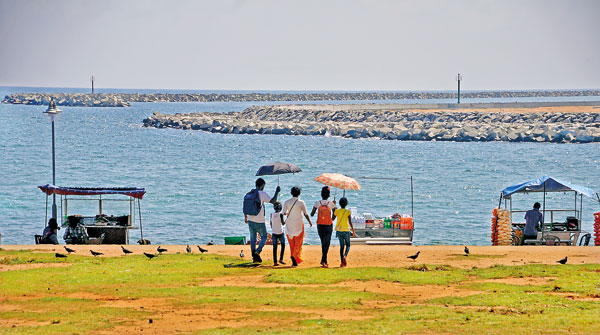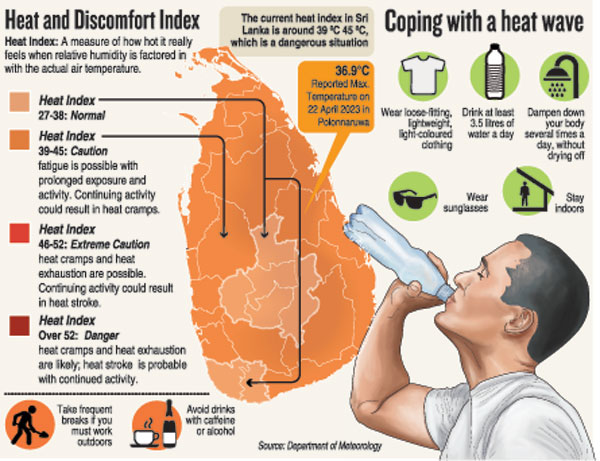News
Dense cities pose greater health risks in time of intense heat
View(s):
Pic by M.A.Pushpa kumara
By Nadia Fazlulhaq
In cities where there is a heavy concentration of buildings and other surfaces such as roads and pavements which absorb and re-emit the sun’s heat, people are being asked to be extra vigilant about heat-related illnesses such as respiratory difficulties, and heat exhaustion.
Such pockets arising in dense cities are called the ‘urban heat islands’ effect. Dense urban areas experience higher temperatures day and night relative to outlying areas.
Those living and working in Colombo, Gampaha, Kandy and the suburbs should take note, health and weather officials say.
“The hot weather is a combination of high humidity and temperature levels, causing extreme discomfort, sweat and thirst for people, and even animals. The scorching sun rays due to the sun being [directly] above the country and lack of wind are also contributing factors,” said Dr. Shiromani Jayawardena, director (forecasting) of the Department of Meteorology.
A heat advisory was issued for the Western, North Western, Northern, North Central and Eastern provinces and Monaragala and Hambantota districts.
These areas will come under ‘caution’ levels in the ‘heat index’ (temperature felt on the human body) between 39 and 45 degrees Celsius. Fatigue and heat cramps are possible with prolonged exposure and activities, the alert said.
This year’s warm temperatures are not limited to Sri Lanka, with neighbouring India reporting deaths from extreme heat and other countries experiencing higher temperatures.

“During the previous years, we did not feel the heat due to the La Niña condition that caused the temperature in surrounding oceans to be below normal resulting in lower global temperatures. However, this June, the El-Nino condition is setting in, triggering warmer temperatures globally. This will bring more warmer months to our country unless we get heavy monsoon rains,” Dr. Jayawardena said.
El-Nino and La Niña are opposite climate conditions in the Pacific Ocean that affect the global climate.
The Met Office urged people to refrain from exerting themselves outdoors, to stay hydrated and wear light coloured, light cotton clothing. Children should not be left unattended and in vehicles.
Consultant nutritionist Dr. Renuka Jayatissa said apart from drinking water, people should consume Vitamin C rich juices as well.
“Narang (local tangerine), water melon, and passion fruit juice are ideal as well as king coconut and barley water. Try to avoid sugary, carbonated drinks. Frequent showers are recommended to avoid rashes and prickly heat among children,” she said.
Sugary drinks have an adverse impact on kidneys in times of high temperatures. She also suggested that families frequently check on the elderly, especially if they are feeling fatigued.
“Elderly, children and pregnant women are vulnerable to dehydration and low sodium levels. Foreign tourists, too, should take precautions as they are not used to such extreme warm tropical weather. Wearing a hat, applying sun lotion, sun glasses are recommended,” Dr. Jayatissa said.
The Health Promotion Bureau this week advised Sri Lankans to avoid being outdoors from 11:00 am to 3:00 pm and that an adult should drink at least 2.5 litres of water a day.
Bird baths and ponds in cities are seen attracting large numbers of birds. Despite high electricity bills, many homes and offices are turning on multiple fans, air coolers, and air conditioners.
Energy demand was also at its highest this week in recent times.
Power and Energy Minister Kanchana Wijesekara said demand exceeded 50 GWh on Thursday and that all CEB thermal plants including the recently established Hambantota diesel power generators will be used.
A spokesperson for the Water Supply and Drainage Board said the use of water has increased this week.
The best way to say that you found the home of your dreams is by finding it on Hitad.lk. We have listings for apartments for sale or rent in Sri Lanka, no matter what locale you're looking for! Whether you live in Colombo, Galle, Kandy, Matara, Jaffna and more - we've got them all!

